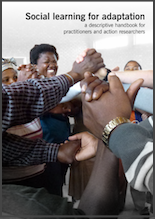Social learning for adaptation: a descriptive handbook for practitioners and action researchers


Introduction
This handbook presents the experience of a participatory social learning process that evolved to support individual and community level adaptation to the myriad of stressors affecting rural people. While the social learning process is presented as a ‘package,’ this is more out of convenience than attempting to represent a perfect model. In other words, genuinely responsive social learning processes may well vary in content, but possibly not in core features from what is presented here. This handbook should therefore be considered as a framework to guide thinking and reflection around how such processes might unfold, and further provide guidance towards possible approaches and activities that may be appropriate in some circumstances.
The most critical factor emerging through the experience of this social learning process is how facilitators see their roles and their relationships with participants. It is essential to strive for a balance between responsiveness and guidance, achieved through an approach that is open, based on a principle of seeking equality, and one that is fully prepared to follow a path different from the one that may have originally been envisaged. This adaptive approach embraces the concept of co-learning, and was one of the objectives of the social learning processes embarked on in this project.
This handbook emerged over the course of four years, during which time facilitators associated with a vulnerability and adaptation research programme set out to support social learning processes in two communities simultaneously. Facilitators did not ‘get it right’ every time, in fact they often got it wrong. However, in a reflexive process such as this, these experiences were used to improve interactions with community members. Here, we try to present not only a process that might assist others who seek to understand local vulnerability and build adaptive capacity in communities, but also some of the key co-learning ‘moments’ experienced along the way in which either the facilitators or the community participants changed their thinking about what they were doing (co-learning in action).
It is important to remember as you read this handbook that the process was developed as part of a broader scientific research project on vulnerability and adaptation to climate change and other stressors, with a focus on knowledge building. It was led through Rhodes University, not through a development agency, and therefore the focus may be quite different from one arising in a more development-based context. Nevertheless, many aspects of the handbook should resonate within different contexts. We believe the handbook will be useful for NGO practitioners who work with communities and seek to build critical capacities, researchers who are interested in processes of action research, social change and co-learning, and government employees who are mandated to support communities in their efforts to collectively overcome hardships.
Suggested citation
Cundill, G., Shackleton, S., Sisitka, L., Ntshudu, M., Lotz-Sisitka, H., Kulundu, I., Hamer, N. (2014) Social learning for adaptation: a descriptive handbook for practitioners and action researchers. IDRC/Rhodes University/Ruliv
(0) Comments
There is no content